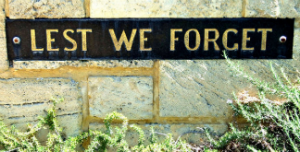Remembrance: time for a rethink?
Leading Remembrance Day worship left one Baptist minister feeling decidedly uneasy. By Andrew Kleissner
Once more I have led my congregation in Remembrance Day worship. Once more we have worn our red poppies, stood in silence to remember those who have died in war, prayed for peace in the world, and lit a candle of recollection and hope. And, once again, I have found the whole event to be decidedly unsettling. I returned home feeling that I had endorsed a ritual in which, given the choice, I would have preferred to play no part.

You mustn’t misunderstand me. We had no marching bands, no fly-past by the Air Force’s finest, no bugle calls or colours - those who wanted such ceremony had to go to the Civic Celebration in the nearby park. We sang neither
O God our help in ages past nor
I vow to thee, my country; our intercessions mentioned several current situations of conflict; our sermon focused primarily on the sacrifice of Christ and his suffering for the world. Yet I still wished that we could have held a service which simply expressed our repentance and sorrow for war, and our heartfelt yearning for something better to replace it as a means of resolving human differences.
So what is it about Remembrance Sunday that makes me so uncomfortable? Perhaps it is the tacit linking of Church and State on occasions such as these; or the use of Christian language and imagery which, although not explicitly approving war, appears to give it some kind of spiritual legitimacy. Perhaps it is the increasing expectation that all must join in this communal outpouring of grief, when a more appropriate response might be to question patriotism and the evils that have been committed in its name. Perhaps it is the branding of every dead combatant as a “hero”; many of them, of course, are amazingly brave individuals, but countless others have been reluctant conscripts, shamefully sacrificed to a political ideal. Or perhaps it is simply the knowledge that many victims of war, especially civilians, will only be briefly acknowledged on this Day, if at all.
Now, I recognise that any society needs collective rituals to express its solidarity; Remembrance Sunday is one such occasion. Yet I, as not only a Christian but a Nonconformist, want to shout out, “Hang on a minute! What would Jesus have said if he had come across one of our celebrations? Wouldn’t he have crashed his way through the multitude, sending military regalia, flags and musical instruments flying and crying out, ‘This is not God’s Kingdom of peace and reconciliation for which I died! Has my suffering been in vain?’ ” Such an act would be hugely provocative, a shocking challenge to the status quo – yet it seems to me to be exactly what Jesus would have done. After all, it was he who scattered the money-changers and traders in the Temple.
I am deeply respectful of those people who say, 'People died so that you can be free to share your opinions', and I hear their voice. I am also aware of those folk, both old and – sadly – young, who are still coming to terms with very personal wartime tragedies. And I recognise that pious words of goodwill are of little use in the face of naked aggression; indeed, I reluctantly agree that there are times when war may be necessary to prevent an even greater tragedy. Nevertheless, I feel that the complex links between our faith, our country, our fighting and our suffering need to be broken for once and for all. But which mainline church will be the first to say, “Remembrance Sunday? In Christ’s name we refuse to do it” – and risk the controversy and opprobrium which will inevitably follow?
Andrew Kleissner is the minister of Christ Church (URC/Baptist), Ipswich
Picture: Tacluda, RGB Stock
Andrew Kleissner, 11/11/2013